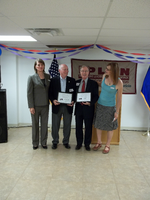Search the Special Collections and Archives Portal
Search Results
Alphabetical subject files, 1955-1997
Level of Description
Scope and Contents
The alphabetical subject files (1955-1997) contains newspaper clippings articles, business information, conference materials, and community organizational materials related to the Las Vegas, Nevada Lesbian, Gay, Bisexual, Transgender, and Queer/Questioning (LGBTQ) community. Subjects include HIV, LGBTQ businesses, censorship, conferences, education, entertainment, human rights, publications, religion, rodeo, and social events.
Archival Collection
Collection Name: Las Vegas, Nevada LGBTQ Collection
Box/Folder: N/A
Archival Component
Members of the Lesbian and Gay Academic Union gathered on the University of Nevada, Las Vegas campus. Back row: Will Collins, Christie Young, Mrk Strain, Debbie Vasquez, Sue Chaney, Cory Chaney, front row: John Snoddy, Alan Wells, David Adams (identified from left to right): photographic slide, 1983 September
Level of Description
Archival Collection
Collection Name: Christie Young Papers
Box/Folder: Box 02
Archival Component
Dennis McBride Photograph Collection
Identifier
Abstract
The Dennis McBride Photograph Collection (approximately 1904-2018) contains over 5,000 individual photographic prints, negatives, digital images, and postcards that depict various events, people, and locations, across southern Nevada, particularly from the 1960s to the 1990s. The postcards depict a large number of hotels and casinos in cities throughout Nevada including Las Vegas, Tahoe, Reno, and Boulder City. The photographs depict a variety of events held at the University of Nevada, Las Vegas Special Collections and Archives, local branches of the Las Vegas Public Library, and local community spaces and stores. The collection also includes a detailed list of photographs from lesbian, gay, bisexual, transgender, and queer (LGBTQ) events taking place across Las Vegas from 1996 to 2018 including Pride parades, social gatherings in bars and nightclubs, holiday celebrations, and political marches and demonstrations.
Archival Collection
Additional accessions, 1970 to 2020
Level of Description
Scope and Contents
The additional accessions series (1970-2020) contains additional material related to the Las Vegas, Nevada Lesbian, Gay, Bisexual, Transgender, and Queer/Questioning (LGBTQ) community, including articles, newsletters, serial publications, conference materials, certificates, awards, and proclamations. Also included are artifacts related to LGBTQ social and political activities in Nevada. Also included are audiovisual materials that have been reformatted into digital files by the donor.
Archival Collection
Collection Name: Las Vegas, Nevada LGBTQ Collection
Box/Folder: N/A
Archival Component
Lesbian and Gay Academic Union of the University of Nevada, Las Vegas field trip to the Ethel M Chocolates Factory and Cactus Garden, 2 Catcus Garden Drive, Henderson, Nevada. Back row: Bill, Hannah Loewy, Michael Loewy; front row: Ron Ong, Mario Gutierrez-Lopez, Rick May (identified from left to right): photographic slide, 1985 April 27
Level of Description
Archival Collection
Collection Name: Christie Young Papers
Box/Folder: Box 02
Archival Component
Dorothy Frassmann oral history interview
Identifier
Abstract
Oral history interview with Dorothy Frassmann conducted by Dennis McBride on September 21, 1997 for the Las Vegas Gay Archives Oral History Project. Frassmann discusses her upbringing from New York, Canada, and Las Vegas, Nevada, notably as a lesbian.
Archival Collection

Transcript of interview with Frankie Perez by Elsa Lopez and Laurents Bañuelos-Benitez, November 5, 2018
Date
Archival Collection
Description
Frankie Perez (1986- ) is an individual that constantly found himself navigating two worlds, whether it was military versus civilian; female versus male; or being Latinx in the United States. As a result of this navigation, Perez has a unique perspective on our ever more complicated world that not many individuals possess. Perez served in the military during the Do Not Ask, Do Not Tell policy which made it difficult for someone dealing with gender identity, to seek out the proper support they need. Despite the policy, and other policies that were put in place afterwards to inhibit the transgender community in the military, Perez began his transition while still serving his country. In direct contradiction of popular opinion, Perez discovered that the military easily accommodated his transition. Outside of the military Perez is an active voice in the LGBTQ community. As a member of the LGBTQ, Latinx, and military community, Perez has a unique perspective that he uses to fight for both LGBTQ and Latinx rights. Currently, Perez is finishing his degree in gender and sexuality studies at UNLV. He hopes to use his education to help people have the difficult discussions and improve conditions for his communities.
Text

Equality Won! Day celebration at Equality Nevada Community Center, 708 South Sixth Street, Las Vegas, Nevada: digital image
Date
Archival Collection
Description
Image
Michael Loewy Papers
Identifier
Abstract
The Michael Loewy Papers (1985-1991) contain bylaws, correspondence, conference programs, suggestions and evaluation forms, agendas, and minutes for the Desert Mountain States Lesbian and Gay Conference. Also included are correspondence from the Lesbian and Gay Academic Union (LGAU) at the University of Nevada, Las Vegas, fliers, and an Empower Each Other directory.
Archival Collection
Marge Jacques Papers
Identifier
Abstract
The Marge Jacques Papers (1960-1990) comprise the personal papers of Marge Jacques, a prominent member of the Las Vegas, Nevada gay and lesbian community, and owner of the gay bar, Le Cafe. The papers contain correspondence, licensing records, financial statements, and artifacts from clubs that Jacques owned or managed. Also included are photographs, videotapes, audiotapes, newspaper clippings, and Gipsy Nightclub promotional material.
Archival Collection
